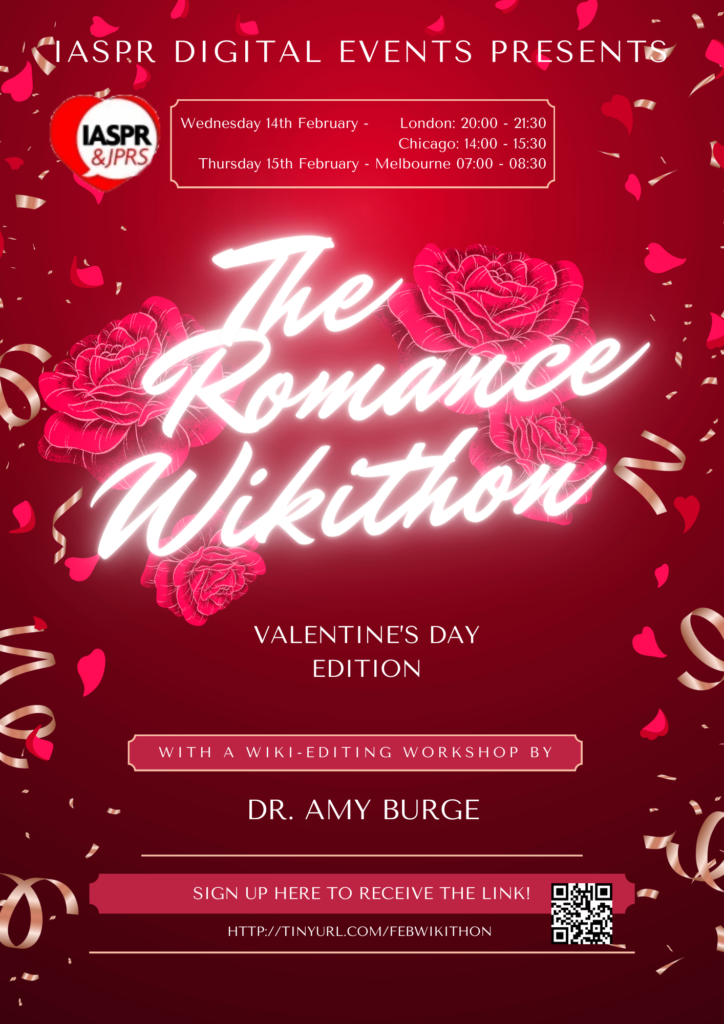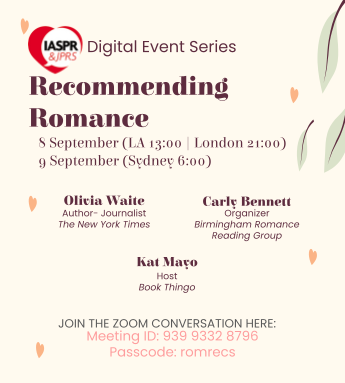Click here to see the full program for the IASPR 2025 conference. If you’re registered, you should have received an email with the program and Zoom details for hybrid access. We’re looking forward to seeing all of our attendees either in person or virtually next week!
IASPR 2025 Conference Information Update
If you’re planning to attend the IASPR 2025 conference in Mexico City in person, we have a new page for you full of lodging, food, and tourism information! Registration remains open [update: registration is now closed] for both in-person and hybrid (online) attendance until June 6. We’re excited to see you and discuss all things romance scholarship, however you are able to attend.
IASPR 2025 Conference Registration Open
Registration is now open for the IASPR 2025 Conference in Mexico City, June 24-26 2025.
Our theme for the 2025 IASPR conference is Romantic Regions, thinking through the evolving relationships between romance, place, and space, building on the previous two IASPR conferences—Sydney 2018 (“Think Globally, Love Locally”) and Birmingham 2023 (“Romance Revitalised”). To read more, visit our conference landing page. Early bird registration runs until February 28th, so register soon for a discounted rate!
Romantic Regions: Call for Papers, IASPR Conference 2025
We are now inviting submissions for the 2025 International Association for the Study of Popular Romance Conference. It will take place from June 24-26 2025 at Universidad Nacional Autónoma de México in Mexico City, with a Zoom option for people unable to attend in person. We are accepting submissions for papers, panels, or workshops delivered in English or Spanish.
Our theme for the 2025 IASPR conference is Romantic Regions, thinking through the evolving relationships between romance, place, and space, building on the previous two IASPR conferences—Sydney 2018 (“Think Globally, Love Locally”) and Birmingham 2023 (“Romance Revitalised”). We encourage people to think broadly and creatively about the idea of the “region”, which may refer to geographic, economic, and/or political regions such as North America, or may be approached from more abstract angles. As Lisa Fletcher and Elizabeth Leane argue in Space, Place and Bestsellers, bestselling novels—like romance novels and other romantic media—“are spatialised in their industrial, social, and textual operations” (2024, 3). This can occur in many different scales, localities and contexts, and we invite you to explore whichever of these you like.
We welcome papers on any of the following in relation to romance (not an exhaustive list):
- World-building / imaginary geographies / secondary worlds
- Translation
- Transnational movement / circulation
- Migration
- Escapism and situated reading
- Romance outside of the global north
- Space
- Adaptation / romance across genres
- Genre boundaries
- Genre-breaking / shifting
- Comparative studies (across regions, genres, languages)
“Romance” here is not limited to popular romance fiction: we welcome discussions of romance in any form. While our theme focuses on place and space, we are also open to papers that take other approaches to romance. If it’s about romance, we’re interested!
Popular Romance Studies is an interdisciplinary field, including (but not limited to) scholars from literary studies; film, television, and media studies; communication and the social sciences; critical race, feminist, queer and disability studies; audience & fan studies, etc. All theoretical and empirical approaches are welcome. So too are all types of contributions, including talks, panels, and workshops on professional development, international collaboration, and pedagogy. Content creators, writers, and professionals from various romance industries are invited to submit proposals as well.
Submit abstracts of 250 words, along with a brief biography of 100 words, by November 30, 2024, through the following Google form: https://forms.gle/PqBPPnaxMfgmvUFGA
Panel submissions of 3-4 related papers are welcome (please provide 250 word abstracts for all papers, along with 100 word biographies of each speaker). If you are proposing a workshop, please fill this form out as if you were submitting a paper, and note that it is a workshop in the title. You must be a member of IASPR to present at the conference.
Please indicate if you are intending to attend in-person or online. You are not locked into this if your plans change, but it will help us get a rough idea of numbers.
If you do not have a permanent academic job at a university (eg. PhD students, contingently employed staff, independent scholars), you may be eligible for the Kathleen Seidel Travel Grant. Please note when you submit your abstract if you wish to receive more information about this opportunity, which will be available in the coming months. If you have any questions or are having difficulty submitting, please contact us at conferences@iaspr.org.
CFP: Romance Area, Conference of the Popular Culture Association (2025)
Romance Area
Conference of the Popular Culture Association (PCA/ACA)
April 16-19, 2025 – New Orleans, Louisiana
Disrobing the Trope
It does not take an expert to see how important tropes currently are in the marketing of romantic media. Whether we’re talking about friends who find themselves in an only-one-bed situation (and thus become lovers), or enemies forced to fake date (and thus become lovers), or a grump who gets a second chance (to become lovers) with their sunshine-y childhood sweetheart, tropes have become ubiquitous to the way romance narratives are discussed.
In the Romance area of PCA, however, we are experts—and thus, for this year’s conference, we’d like to provoke people to think through and theorize the trope in popular romantic media.

In particular, we pose three provocative questions:
1) what are tropes?
2) what do tropes do?
3) where do tropes come from?
We encourage you to respond to these questions broadly, and to think not just about specific texts but also about their creators, consumers and critics, to understand the broader discussions in which these texts are implicated.
We need to stop taking tropes for granted. This conference is the time to set aside our customary acceptance of tropes as a central feature of romance and look more analytically at their origins, functions, and meanings. As both scholars and consumers of romantic imagery and narratives, of course we have our own favorite tropes, and others we despise. However, our aim in raising this topic is not to rehash those familiar debates about which texts and tropes are “good” or “bad.” Instead, we invite deep thinking from the scholarly community on the strange problem that is the trope.
If the thought of talking about tropes doesn’t float your boat, or you simply want to pursue your own intellectual passion, you are very welcome to do so.
Who we are
The Romance Area of the PCA is deeply interested in popular romance both within and outside of mainstream popular culture, now or in the past, anywhere in the world. Scholars, romance writers, romance readers/viewers, romance industry professionals, librarians, and any combination of these are welcome. You do not need to be an academic or have an institutional affiliation to be part of the Romance area. Undergraduates sponsored by an academic mentor are also welcome. Please see the Romance area on the PCA website for our policy for undergraduates; if the website is difficult to navigate, contact us and we’ll send you a copy of the policy.
The Romance area invites any theoretical or (inter)disciplinary approach to any topic related to romance. Past presenters have drawn on methods from literary studies, history, library sciences, sociology, film studies, and creative writing, to name the most common approaches—we’ve even had a presentation with puppets (you know who you are). We’ve loved all of these.
Finally, we are not interested solely in novels! The Romance area is open to engagements with all forms of media and culture that are concerned with romance, including, but not limited to, the following: art; literature; philosophy; radio and audio media; film and television; comics and graphic novels; videos, webzines and other online storytelling; and apps, including dating apps.
As the global pandemic continues, plans may change. You can check the PCA website for updates. We will also send updates to our Romance Area mailing list. If you are not on the mailing list and wish to be, please contact us.
Submit 250-word abstracts to pcaaca.org by November 30, 2024. One of us will review them within two weeks or so and notify you about our decision. You’ll hear more from us as the date approaches.
Please feel free to forward, cross-post, or link to this call for papers.
If you have any questions at all, please contact the area chairs:
Dr. Heather Schell
George Washington University
Washington, DC
schellhm@gwu.edu
Dr. Jodi McAlister
Deakin University
Melbourne, Australia
jodi.mcalister@deakin.edu.au
IASPR 2025: See you in Mexico!
We’re pleased to announce that IASPR’s 2025 conference will be held at the Universidad Nacional Autónoma de México in Mexico City! We’re working hard on the CFP and other details, so stay tuned for more information.
The Romance Wikithon!
Valentine’s Day is coming up, and we’ve decided to celebrate by adding to public knowledge about popular romance media and expanding romance’s representation on Wikipedia, one of the world’s most frequently-accessed resources.
Join us on February 14th/15th (depending on your time zone) for a virtual Wikipedia editing party!
This 90-minute session will be practical and informal. It is aimed at those who have never edited Wikipedia before. Training and guidance will be given. Recommended for those who might be interested in using Wikipedia as part of teaching, for those who are interested in learning more about how to edit Wikipedia, and for anyone who would like to make positive change in the world! The session will be facilitated by Dr Amy Burge, who has run editathons at the University of Cardiff, and has used Wikipedia for assessment with students.
When:
Wednesday 14th February London 20:00-21:30
Chicago 14:00-15.30
Thursday 15th February Melbourne 07:00-08:30
Free Registration Link:
HTTP://TINYURL.COM/FEBWIKITHON
All interested people are welcome to attend, whether or not they are IASPR members! Feel free to share this post, or the poster with your friends and colleagues, and we look forward to seeing you on the 14th/15th.

CFP: Romance Area, Conference of the Popular Culture Association
Looking for a friendly romance conference to bridge the gap until the next IASPR gathering? One option is the Romance Area of the annual Popular Culture Association conference, which is co-chaired by IASPR Vice President Jodi McAlister and long-time IASPR member Heather Schell. Please see their CFP below!
Romance Area
Popular Culture Association Conference (PCA/ACA)
March 27-30, 2024 – Chicago, Illinois
Ugly Love
When critical attention to romance rebooted in the 21st century, the new wave of scholars made a conscious decision to move away from the often-pejorative approaches of earlier critics and focus instead on romance’s strengths: an emphasis on women’s pleasure, for example, and models of good communication.
However, romance is an emotion-centered genre, and the sentiments it explores include such ugly feelings as jealousy, envy, and a thirst for vengeance. Ugly themes and ugly tropes also abound (see, for instance, the bully romance, or the recuperation of Nazis as romantic heroes), as well as plentiful examples of ugly behaviors in media cultures surrounding romance (such as the recent sexual harassment scandal that erupted around a section of hockey romance fans on TikTok).
The theme of the PCA Romance area in 2024 is the ugly in romance and romantic media. We encourage you to define this theme broadly, and to think not just about specific texts but also about their creators, consumers and critics, to understand the broader discussions in which these texts are implicated.
We also encourage you to move away from decisionist and diagnostic approaches that seek to position texts on a spectrum of progressivism to conservatism. Our aim in raising this topic for exploration is not to pass judgment, but to enable deep thinking in the scholarly community – to ask questions that go beyond asking whether texts and tropes are “good” or “bad” and think in more nuanced, layered ways about their affordances and the work they perform.
Possible topics on this theme could include:
- negative emotions, affect theory, and romance
- tropes: enemies to loves, the other woman, etc.
- Taming of the Shrew and its remakes
- erotica and fantasies of submission: the legacy of Fifty Shades
- the villain hero, the criminal hero, the morally grey hero
- criminal dyads: Bonnie and Clyde, etc.
- ugly scandals in book and media culture
- cheating, lying, and misbehaving love interests
- break-up revenge songs
- jealousy in poly romance
- bully romance, mafia romance, stalker romance, dark romance
- fantasies of sexual coercion
- degradation
- the eroticised abject and/or the eroticised disgusting
- hate reading and/or hate watching
- extreme confession/memoir (ex. Bentley’s The Surrender, The Story of O, etc.)
- transactional sex
- dirty talk
- ugly emotion and the therapeutic romance
If none of these suggestions appeal, or you simply want to pursue your own intellectual passion, you are very welcome to do so.
Who we are
The Romance Area of the PCA is deeply interested in popular romance both within and outside of mainstream popular culture, now or in the past, anywhere in the world. Scholars, romance writers, romance readers/viewers, romance industry professionals, librarians, and any combination of these are welcome. You do not need to be an academic or have an institutional affiliation to be part of the Romance area. Undergraduates sponsored by an academic mentor are also welcome (please see the Romance area on the PCA website for our policy for undergraduates).
The Romance area invites any theoretical or (inter)disciplinary approach to any topic related to romance. Past presenters have drawn on methods from literary studies, history, library sciences, sociology, film studies, and creative writing, to name the most common approaches—we’ve even had a presentation with puppets (you know who you are). We’ve loved all of these. We would also like to emphasize that you do not need to write about romance novels to participate in this area (although that is obviously welcome!). The Romance area is open to engagements with all forms of media and culture that are concerned with romance, including, but not limited to, the following: art; literature; philosophy; radio and audio media; film and television; comics and graphic novels; videos, webzines and other online storytelling; and apps, including dating apps.
As the global pandemic continues, plans may change. You can check the PCA website for updates. We will also send updates to our Romance Area mailing list. If you are not on the mailing list and wish to be, please contact us.
Submit 250-word abstracts to pcaaca.org by November 30, 2023, but ideally by November 29th to make it easier for our area chairs, since the PCA website is tricky this year! One of us will review them within two weeks or so and notify you about our decision. You’ll hear more from us as the date approaches.
Please feel free to forward, cross-post, or link to this call for papers.
If you have any questions at all, please contact the area chairs:
Dr. Heather Schell
George Washington University
Washington, DC
schellhm@gwu.edu
Dr. Jodi McAlister
Deakin University
Melbourne, Australia
jodi.mcalister@deakin.edu
IASPR Digital Event Series: Recommending Romance
There are so many romance novels in the world. How do you decide where to start reading? How do you decide what to recommend to your friends, family, or coworkers who are curious about the genre? What are the ins, outs, and ramifications of recommending romance?
Join fellow romance scholars and fans for a digital panel on recommending romance featuring:
- Olivia Waite, romance author and journalist for The New York Times
- Carly Bennett, organizer of the Birmingham Romance Reading Group
- Kat Mayo, host of Book Thingo
When
8 September (LA 13:00 London 21:00)
9 September (Sydney 6:00)
Where
Zoom. Meeting ID: 939 9332 8796 Passcode: romrecs
You can sign up to get information about our future events by visiting this link: https://t.co/gmW1oZKXRd

2023 Conference Program: Romance Revitalised
Use this page to view the program for Romance Revitalised, or download the pdf here.
